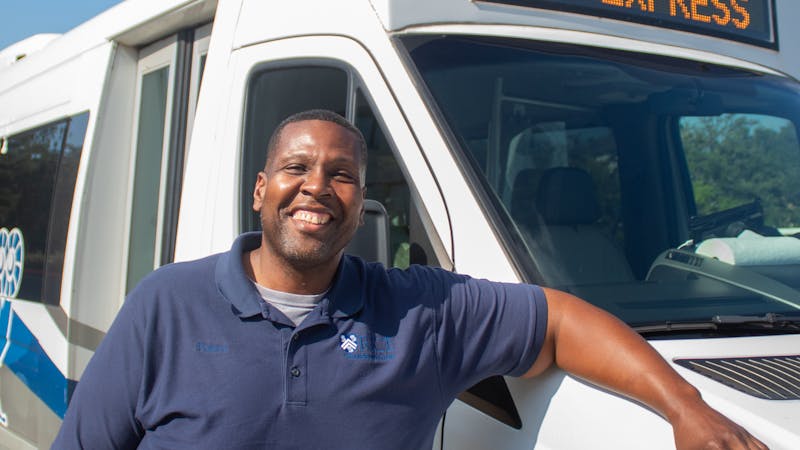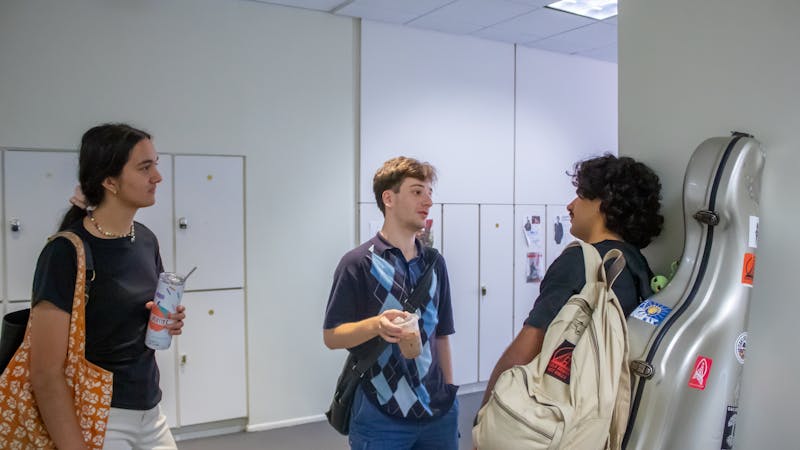Senior Spotlight: Isabel Sjodin talks chemical engineering and residential college leadership

Katherine Hui / Thresher
Even though McMurtry College senior Isabel Sjodin was raised in Houston, she didn’t know much about Rice until her junior year of high school. She said the first time she was scheduled to tour Rice she ended up chatting with a Rice student on campus and missing said tour. However, that conversation and a later overnight visit at Sid Richardson College made a strong impression on her.
“Up until [Owl Days], I thought [the residential colleges] were glorified dorms,” Sjodin said. “But [my host] had been there for six weeks, and I remember walking through the hallways and she knew everyone at Sid and she introduced me to them. Everyone was so nice. I didn’t really expect the upperclassmen to care about the prospective students. A lot of little things like that made a big impression on me.”
While she matriculated as a chemistry major, Sjodin said she wondered whether she wanted to do chemistry long term.
“I was one of those kids who took AP Chemistry in high school and really liked it,” Sjodin said. “I knew going into Rice I had two years to figure out what I wanted to do. One thing I appreciated about Rice was that they built in a lot of flexibility. I explored everything from chemistry to sociology to bioengineering.”
By the end of her freshman year, Sjodin realized how much she valued chemical engineering. She said that the field appealed to her since it offers multiple career options post-graduation.
“Chemical engineering at Rice doesn’t just recruit for oil and gas. Part of the attraction for Rice was that I knew I had industry as an option, grad school as an option, investment banking as an option,” Sjodin said. “I chose chemical engineering in part because of the technical aspects, but because I also really value flexibility.”
According to Sjodin, who has always been interested in different industries, she will be working as a consultant after graduation.
“Management consulting has been on my radar for a while,” Sjodin said. “I like having different contexts to the problems we are focusing on, [and] one of the things I’ve noticed through my time at Rice is that I have really enjoyed fixing problems in different areas and working explicitly with people.”
Sjodin said that it was also during her first year at Rice that she decided to take advantage of the resources offered by the Doerr Institute. She underwent one-on-one coaching with a leadership coach her freshman fall.
“It changed the way I interacted with people,” Sjodin said. “I think for me that was very helpful in realizing that leadership isn’t just telling people what to do. It helped me focus a lot more on why I was specifically interested in being involved.”
Sjodin said her experience with the Doerr Institute helped in her positions at her residential college, where she is heavily involved. As a freshman, she joined the Associates Committee and became head of that and the Externals Committee in spring 2019.
A year later, Sjodin transitioned to the role of prime minister, overseeing the social committees at McMurtry – planning everything from FITQs to Y2K. However, a week after she stepped into this role, the pandemic brought life to a halt, she said.
“I had all these different goals – the way we talked about events, the way we threw events – then the focus shifted to ‘Are we having events?’ The guidelines were constantly shifting and we all had to be very flexible,” Sjodin said.
According to Sjodin, serving as prime minister at McMurtry was a rewarding experience.
“It was a lot of time, but it was something I definitely cared about,” Sjodin said. “There was a big focus on trying to maintain a sense of community. For the most part, the ideal is [that] people are involved in their college government because they care about it and they have goals they are trying to achieve.”
Sjodin said that even though she has stepped back during her senior year, she is still involved in maintaining that sense of community and helping other Murts. Having been prepared to organize events prior to the pandemic, Sjodin has been helping underclassmen with reviving traditions now that COVID-19 restrictions are relaxed.
“There are a lot of questions like ‘How were things done?’ and ‘Are there traditions we’re forgetting?’ One of the sophomores and I have been sitting down recently and writing down all the traditions, like crawl etiquette … or making a FWIS groupchat,” Sjodin said.
Sjodin said that she has also been taking the time to enjoy senior year while reflecting on her identity.
“I think it’s been very nice to focus on spending time with my friends and thinking through a lot of the existential crises that come with senior year,” Sjodin said. “One of the big ones is ‘Who am I when I’m not at Rice?’ I’ve had more free time to do a lot of the things I really enjoy, like photography and painting. It’s nice to have little pockets of time to go find people and try things out.”
More from The Rice Thresher

Over 1,000 students petition against new meal plan
When Konstantin Savvon opened the Housing and Dining email announcing the new unlimited meal plan, he was instantly concerned about the impact on off-campus students like himself.

Rice shuttle bus drivers reflect on changes and connections behind the wheel
Martine Stewart has spent the past year behind the wheel of Rice’s greater loop shuttle, circling the inner campus from the early morning to late afternoon. She said she has come to recognize many of her regular riders – not just their faces, but the exact spots where they wait to be picked up.

Music majors at Rice’s Shepherd School tackle busy schedules, future goals
Cirdan Vonnahme began playing the cello at 4 years old. After winning his first competition at 11 and debuting with an orchestra, he realized he wouldn’t mind playing the cello for life.

Please note All comments are eligible for publication by The Rice Thresher.